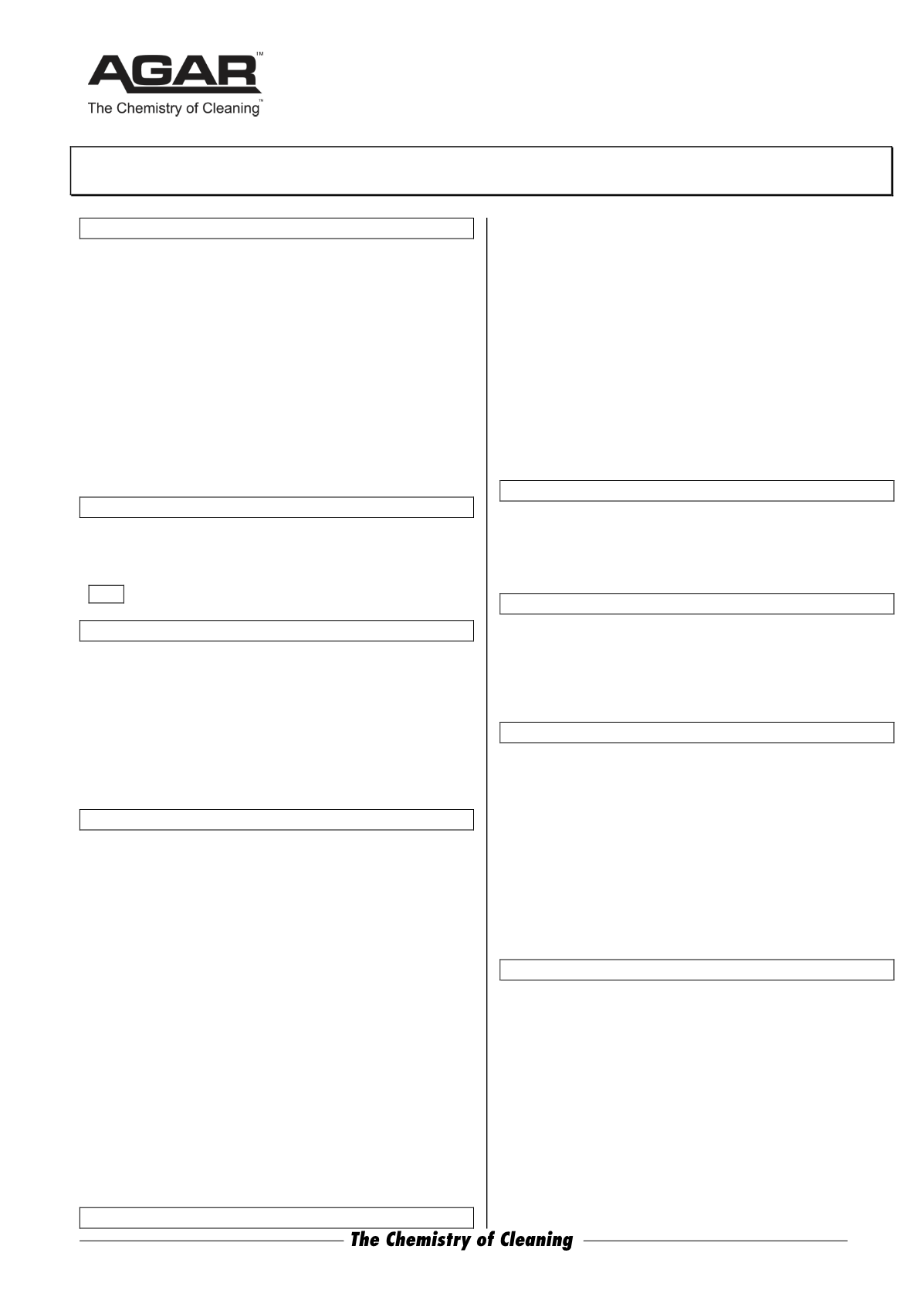

ABN 80 004 726 890 | MADE IN AUSTRALIA
VIC 03 9480 3000
NSW 02 9743 6020
SA 08 8293 2020
QLD 07 3274 3438
WA 08 9249 4566
Safety Data Sheet
Issued: December 21, 2015
Page 1 of 2
G-SOLVE
1 IDENTIFICATION OF THE MATERIAL AND SUPPLIER
Product Name:
G-SOLVE
Other Names: None
Manufacturer's Product Code: GSO5, GSO1
Product Use: Stain remover for hard surfaces, carpet and fabrics
SUPPLIER DETAILS
Company: Agar Cleaning Systems Pty. Ltd.
Address: 12-14 Cope Street, Preston, Vic. 3072
Telephone: 03 9480 3000
Facsimile: 03 9480 5100
Web
: www.agar.com.auAgar SDS are available from this website.
Email:
admin@agar.com.auEmergency Telephone Number: 131 126
(Aust wide)
2 HAZARDS IDENTIFICATION
Hazardous according to criteria of Safe Work Australia.
Irritant Xi. Not classed as Dangerous Goods.
Risk: May cause sensitisation by skin contact. [R43]
3 COMPOSITION / INFORMATION ON INGREDIENTS
Ingredients:
Chemical Entity: CAS No.: Proportion:
Hydrocarbons - > 60%
Surfactants non-haz < 10%
Dipentene
5989-27-5
< 10%
Diglycol ether - < 10%
Other ingredients determined not to be hazardous to 100%
4 FIRST AID MEASURES
Poisons Information Centre: Phone 131 126
Swallowed:
If poisoning occurs, contact a doctor or Poisons
Information Centre. If swallowed, do NOT induce vomiting.
Give a glass of water to drink. Rinse mouth with water. Never
give anything by mouth to an unconscious person. If vomiting
occurs spontaneously, keep head below hips to prevent
aspiration.
Eye:
Immediately hold the eyes open and wash continuously
for at least 15 minutes with fresh running water. Ensure
irrigation under eyelids by occasionally lifting the upper and
lower lids. Transport to hospital or doctor without delay.
Removal of contact lenses after an eye injury should only be
undertaken by skilled personnel.
Skin:
Remove any contaminated clothing and flush area with
water and soap if available. Seek medical attention in the
event of irritation.
Inhaled:
This is considered to be unlikely to cause any
reactions. However, if any effects are observed, remove
affected person to fresh air. Lay the patient down, keep warm
and rested. If breathing is shallow or as stopped, ensure clear
airway and apply resuscitation.
5 FIRE FIGHTING MEASURES
Fire/Explosion Hazard: G-Solve is combustible.
Fire Extinguishing media: Water spray or fog. Foam. Dry
chemical powder.
Fire Fighting PPE: Wear full protective clothing and self-
contained breathing apparatus.
Special fire-fighting procedures: Use water spray to cool fire-
exposed surfaces and to protect personnel. Shut off “fuel” to
fire. Do not use water in a jet.
Unusual fire hazards: Carbon monoxide may be evolved if
incomplete combustion occurs. Will float and be re-ignited on
surface water. Vapour is denser than air, remote ignition is
possible.
Hazardous products of combustion: Thermal decomposition in
large fire may yield toxic fumes.
6 ACCIDENTAL RELEASE MEASURES
Clean up all spills immediately. Spills may be slippery. Avoid
contact with skin and eyes. Contain spill and mop up, or soak up
with an inert absorbent material. Place in a suitable, labelled
container for waste disposal.
7 HANDLING AND STORAGE
Storage and Transport: Store in a cool, dry place. Avoid heat,
sparks, open flames and other ignition sources.
Incompatibility (Materials to avoid for purposes of transport,
handling and storage only): Avoid strong oxidizing agents.
8 EXPOSURE CONTROLS / PERSONAL PROTECTION
Exposure Standards: None assigned for mixture.
Exxon recommends an Occupational Exposure Limit of
300ppm total hydrocarbon.
Engineering Controls: Mechanical ventilation: Not required
under normal conditions.
Personal Protection:
Gloves - Wear PVC or nitrile gloves if repeated skin contact
may occur.
Eye-protection – Not normally required.
Other – Not normally required.
9 PHYSICAL AND CHEMICAL PROPERTIES
Appearance: Transparent colourless liquid
Odour: Slight solvent odour
pH = N/A
Vapour Pressure: N/K
Vapour density: N/K
Boiling Point: Approx 100°C
Freezing Point: < 0
°
C
Flash point: >85
o
C open cup
Solubility in water: Infinitely miscible
Specific Gravity: 0.8 - 0.9
Evaporation rate: N/K
% volatile by vol: 90 – 95%
Please turn to page 2.


















